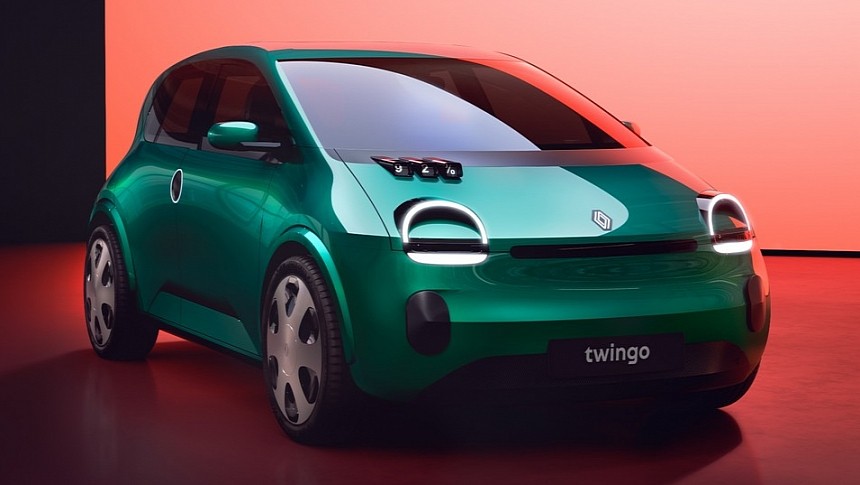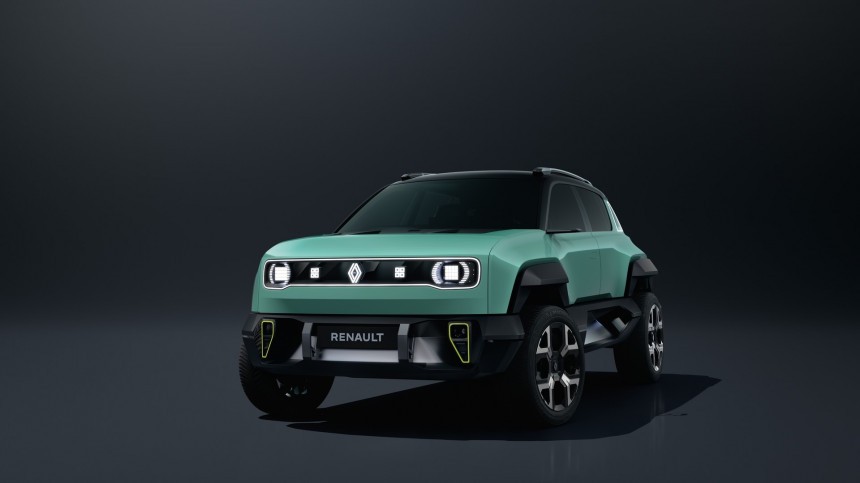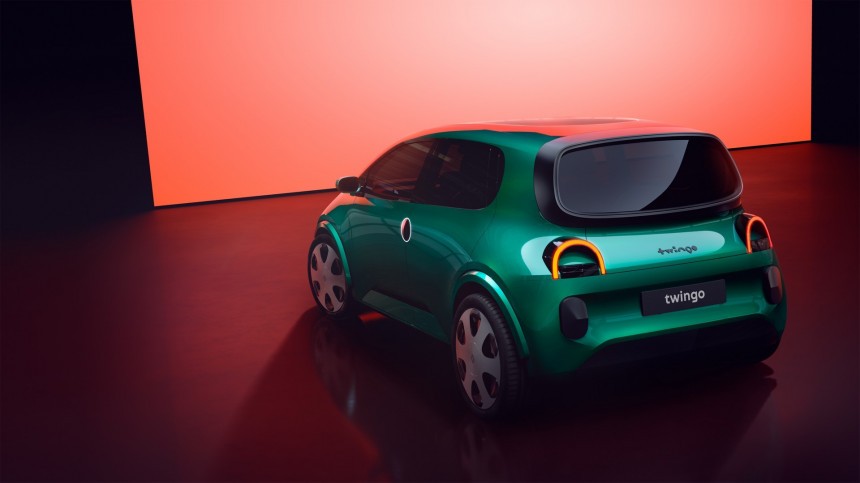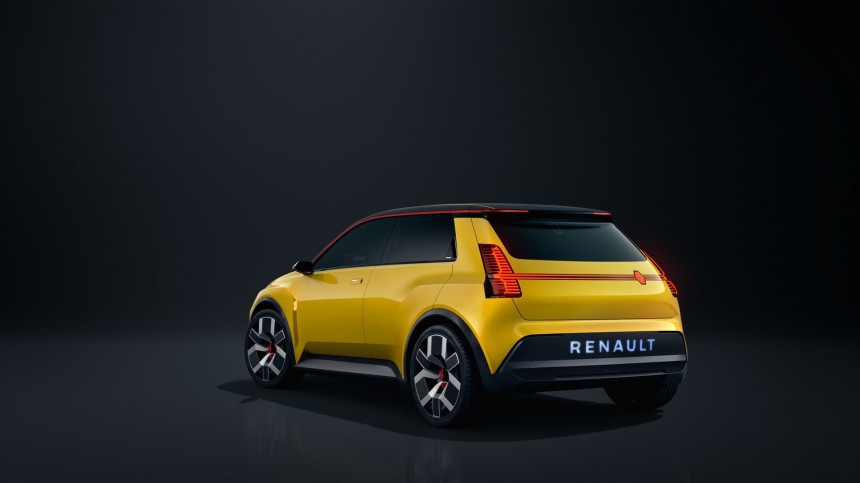Renault made waves with its Capital Market Day for Ampere, even in countries where it does not sell vehicles. Everybody fell in love with the future Twingo, a car that just celebrated 30 years of a really innovative proposal. The fourth generation of this model promises to do the same by bringing to market a €20,000 battery electric vehicle. Yet, Renault's presentation was about so much more than that… It was about using legacy as an advantage in the race for electrification.
If you are used to the EV jargon, you know that this word has a negative connotation for advocates. They refer to legacy automakers as if they were the old-timers ready to be replaced by companies like Tesla, which do everything differently, starting with the sales models. For those trying to mock legacy carmakers, dealerships are a nuisance, and the past does not help. Luca de Meo seems determined to prove them wrong.
The Renault and Ampere CEO has worked for Fiat and Volkswagen. Not by chance, he helped bring back the Fiat 500 in the Italian carmaker. When he joined the German competitor, he was sensible enough to give the third generation of the Beetle the names it had in each market: Käfer, Coccinelle, Fusca, Vocho, Carocha… De Meo knew that evoking good memories does not rely solely on a similar form, but also on the same name. However, Volkswagen's attempt still lacked what the Fiat 500 had: coherence with the original proposition. In other words, the same soul, even if in a more modern body.
The executive seems to have learned that lesson. Renault is bringing from the dead several nameplates that helped build the brand – all of them in battery electric vehicles. The Scénic presents the most extreme change. Ironically, the changes aimed to save the original ethos of the car: a family hauler that moms would want to drive or own. In the 1990s, it was a minivan. Nowadays, that's an SUV – or anything that looks like one. The Mégane did not have to die to turn into an electric SUV, but it is the exception that confirms the rule.
Check the Renault 4. The French automaker may call it 4Ever, a clever wordplay with an iconic car helping the company establish itself as a credible player in the EV world. The design also reminds us of the original vehicle. De Meo stressed it will be a versatile SUV. The original Renault 4 was called the "jeans pants" of the automotive world precisely because of this characteristic. It was also reliable, something the CEO stressed the new vehicles have to be. As the early adoption frenzy died, trust is what BEVs have to offer.
De Meo defines the Renault 5 as "the car that everybody wants." If the French company had kept the nameplate and developed it, it would be a Volkswagen Golf competitor nowadays, just like the Mégane is. By bringing it back from where it stopped, it will return as a B-segment hatchback with up to 400 kilometers of range. When the production version makes its world premiere at the Geneva Motor Show in February, it will try to conquer the orphans of vehicles such as the Ford Fiesta.
The Twingo will be the entry-level car, costing less than €20,000. Renault plans to deliver that with LFP cells in a cell-to-pack (CTP) construction, all in a much smaller battery pack. It will still offer an impressive range, thanks to energy efficiency. Renault promised it would make 100 kilometers with 10 kWh, which is equivalent to 6.21 miles/kWh. If the French carmaker manages to deliver that, it will sell the world's most efficient BEV by a wide margin.
This nostalgic lineup will be sold by a dealership network, which De Meo said 70% of Renault's customers want. In other words, he did not try to defend this sales model: the executive just said that buyers prefer it. The advocates of new BEV makers will say that this is because they have no idea how convenient direct sales are, but haven't they?
I have already written of lousy delivery experiences in which the vehicles some people bought were just taken anywhere they wanted and left there with several defects. That forced these new customers to go to the service centers either to demand repairs or to try to give the cars back. Supposing everything went well with the delivery, buyers may have to contact the service centers for any reason. If they were dealers, they would just call or show up at the dealership to get things sorted out. In a direct sales model, you have to open a ticket and wait – sometimes for several weeks. How convenient is that? Above all, convenient to who?
The dealership model has plenty of defects, but it is "the known devil." If Renault is right, 70% of car buyers prefer it to any other model. It is familiar, like Renault 4(Ever), Renault 5, Scénic, Mégane, and Twingo also are. They offer an "emotional shortcut accompanying them into the future," as De Meo put it.
Renault will still have to answer how it plans to keep these cars on the road when it is necessary to replace their battery packs, which should come even sooner with their vehicle-to-load (V2L) capability. That happens because all cells have a limited lifespan, either related to cycles (full charges) or time. A 30-year Twingo can still run if its engine has been properly serviced, but you will never see a BEV with a 30-year battery pack.
This is the transition that Renault and several other companies have to prepare their customers for. When people talk about legacy with a certain despise, they forget that several others cherish "the good old times." They have fond recollections of their childhoods, first cars, loved ones that are no longer here, things that are long gone. If you can present them with a new way of owning and driving a car that can "awaken people's emotions and memories," that's an asset, not a handicap. Renault may be the first "legacy automaker" to take advantage of its heritage toward an electrified future. Watch it closely.
The Renault and Ampere CEO has worked for Fiat and Volkswagen. Not by chance, he helped bring back the Fiat 500 in the Italian carmaker. When he joined the German competitor, he was sensible enough to give the third generation of the Beetle the names it had in each market: Käfer, Coccinelle, Fusca, Vocho, Carocha… De Meo knew that evoking good memories does not rely solely on a similar form, but also on the same name. However, Volkswagen's attempt still lacked what the Fiat 500 had: coherence with the original proposition. In other words, the same soul, even if in a more modern body.
The executive seems to have learned that lesson. Renault is bringing from the dead several nameplates that helped build the brand – all of them in battery electric vehicles. The Scénic presents the most extreme change. Ironically, the changes aimed to save the original ethos of the car: a family hauler that moms would want to drive or own. In the 1990s, it was a minivan. Nowadays, that's an SUV – or anything that looks like one. The Mégane did not have to die to turn into an electric SUV, but it is the exception that confirms the rule.
De Meo defines the Renault 5 as "the car that everybody wants." If the French company had kept the nameplate and developed it, it would be a Volkswagen Golf competitor nowadays, just like the Mégane is. By bringing it back from where it stopped, it will return as a B-segment hatchback with up to 400 kilometers of range. When the production version makes its world premiere at the Geneva Motor Show in February, it will try to conquer the orphans of vehicles such as the Ford Fiesta.
The Twingo will be the entry-level car, costing less than €20,000. Renault plans to deliver that with LFP cells in a cell-to-pack (CTP) construction, all in a much smaller battery pack. It will still offer an impressive range, thanks to energy efficiency. Renault promised it would make 100 kilometers with 10 kWh, which is equivalent to 6.21 miles/kWh. If the French carmaker manages to deliver that, it will sell the world's most efficient BEV by a wide margin.
I have already written of lousy delivery experiences in which the vehicles some people bought were just taken anywhere they wanted and left there with several defects. That forced these new customers to go to the service centers either to demand repairs or to try to give the cars back. Supposing everything went well with the delivery, buyers may have to contact the service centers for any reason. If they were dealers, they would just call or show up at the dealership to get things sorted out. In a direct sales model, you have to open a ticket and wait – sometimes for several weeks. How convenient is that? Above all, convenient to who?
The dealership model has plenty of defects, but it is "the known devil." If Renault is right, 70% of car buyers prefer it to any other model. It is familiar, like Renault 4(Ever), Renault 5, Scénic, Mégane, and Twingo also are. They offer an "emotional shortcut accompanying them into the future," as De Meo put it.
This is the transition that Renault and several other companies have to prepare their customers for. When people talk about legacy with a certain despise, they forget that several others cherish "the good old times." They have fond recollections of their childhoods, first cars, loved ones that are no longer here, things that are long gone. If you can present them with a new way of owning and driving a car that can "awaken people's emotions and memories," that's an asset, not a handicap. Renault may be the first "legacy automaker" to take advantage of its heritage toward an electrified future. Watch it closely.


























